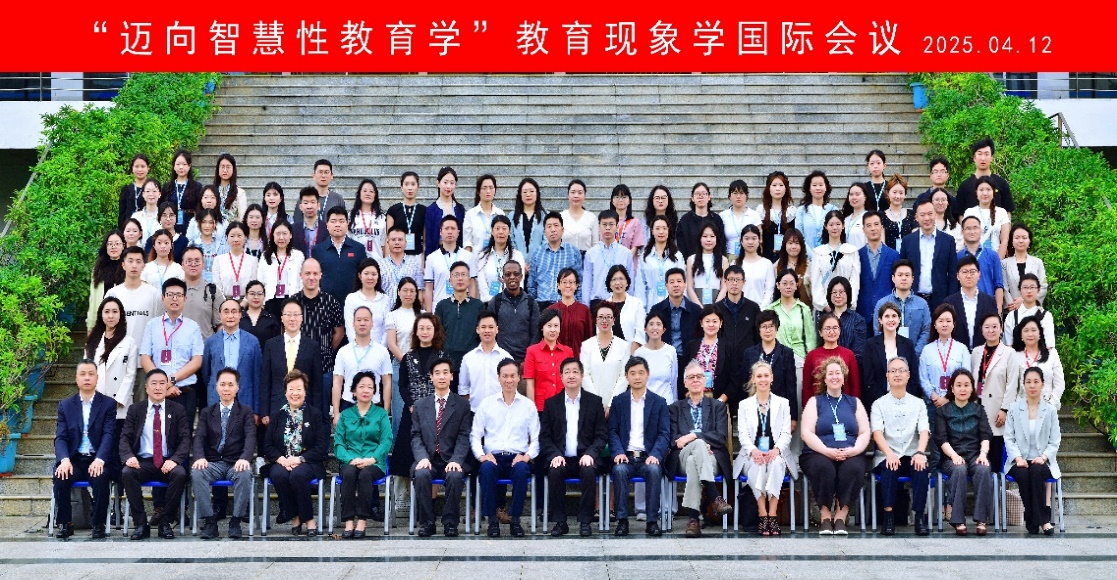From April 11 to 14, 2025, the International Conference on Phenomenological Pedagogy (ICPP 2025), themed "Towards Thoughtful Pedagogy," took place at Shenzhen University. The event brought together over 400 scholars and practitioners from nearly 100 universities and institutions across China, as well as participants from close to 20 countries, including the United States, Canada, the Netherlands, Hungary, Norway, Singapore, Malaysia, Thailand, and Vietnam. This remarkable attendance underscores the growing significance of phenomenological pedagogy as a global educational movement.
The conference was jointly organized by the Faculty of Education and the Institute of Educational Research at Shenzhen University, with support from the Faculty of Education at Henan University and the School of Educational Science at Gannan Normal University. This collaboration emphasized the event's role as a major academic convergence in the field of education.
In his opening remarks, Li Yonghua, Vice President of Shenzhen University, highlighted the conference’s mission to advance high-quality teacher education and encourage interdisciplinary dialogue among international scholars. Conference Chair Professor Sean Shuying Li welcomed attendees, expressing gratitude for their participation and noting that this conference is the first international event focusing on “Phenomenological Pedagogy” and “Thoughtful Pedagogy.” He emphasized the importance of reimagining education as a reflective, human-centered endeavor, particularly in the era of artificial intelligence and disruptive technologies.
The conference featured 12 keynote speeches from esteemed international experts who presented groundbreaking perspectives on phenomenological pedagogy. For instance, Professor Rebecca Lloyd (University of Ottawa, Canada) introduced the Phenomenology of Movement Awareness, offering strategies to enhance embodied learning in physical education. Professor Gábor Halász (Eötvös Loránd University, Hungary) discussed the convergence of phenomenological pedagogy with industry-academia collaboration, advocating for a teacher-centered model linking educational theory with workplace practice. Other keynotes, including contributions from Professor Sally Pirie (University of Massachusetts, the USA) and Professor Maitree Inprasitha (Khon Kaen University, Thailand), emphasized the integration of experiential and cultural understanding in teacher training and reflective teaching practices.
Chinese scholars made substantial contributions as well. Professor Liu Tiefang (Hunan Normal University) revitalized the artistry of teaching with his philosophy of “activating the self to awaken others,” rooted in Confucian thought. Professor Wang Nan (Guangxi Normal University) examined how phenomenological pedagogy supports intelligent professional development in digitally driven education ecosystems. In addition, Professor Tan Chuanbao (Beijing Normal University) advocated for disciplinary aesthetic education, illustrating its potential to enrich teaching effectiveness and reshape educational cultures. Professor Li Chen (Shenzhen University) explored the curricular significance of student study tours, integrating life inquiry with academic learning.
Over the four days, the conference conducted 16 parallel sessions featuring a total of 82 presentations, allowing participants to engage deeply with topics such as AI-driven learning environments, teacher identity reconstruction, and cross-cultural research exploring diverse pedagogical models. A special emphasis was placed on the importance of phenomenological research methodology, which invites educators to center lived experiences in their inquiries, providing insights into the relational and emotional dimensions of teaching and learning.
A field visit to Shenzhen Nanshan Foreign Language School’s Second Experimental School allowed delegates to observe the fusion of traditional culture with modern pedagogy. Attendees were particularly impressed by Guangdong Han Opera-themed classes, exemplifying innovative approaches to cultural preservation and educational design.
In his closing remarks, Professor Li Shuying celebrated the conference as a pivotal moment for global dialogue on thoughtful pedagogy. He stated, “This gathering marks the first-ever international conference on phenomenological pedagogy, a testament to the growing importance of this field and the urgent need for a shared platform for educators to exchange ideas grounded in human experience.” He emphasized that the pursuit of thoughtful pedagogy calls for ongoing reflection, collaboration, and a commitment to fostering spaces where inquiry and empathy thrive.
The conference concluded with a resolution to establish a biennial international platform dedicated to advancing humanistic educational research and contributing Chinese perspectives to the evolution of phenomenological pedagogy worldwide.


